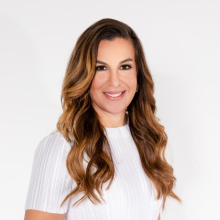We made it through another topsy-turvy year. Many technology leaders are reflecting on some pretty massive achievements over the past two years ‒ from turning on a dime to pivot entire organizations to remote work to accelerating their digital transformation and driving business performance through collaborative, strategic efforts.
Most of us feel like we’ve been running a marathon for the past two years. It’s not surprising that disengagement, burnout, and turnover are on the rise. But all signs point to more unpredictability ahead, and we need to make sure we and our teams have the mental and physical energy to not just tackle the next challenges but also keep an eye on what’s to come.
As I was thinking about who could share some insights about how to help leaders kick things off on the right note this year, one name came to mind immediately. Rhonda Vetere is a technology executive whose CIO journey has spanned multiple industries and countries. Most recently CIO and EVP for global nutrition company Herbalife, she’s also an endurance athlete, a twice-published author, a board member, a mentor, and a change agent.
[ Get answers to key digital transformation questions and lessons from top CIOs: Download our digital transformation cheat sheet. ]
When I spoke with Vetere recently for my CIO Whisperers podcast, she had just come back from running a marathon in South Africa and then immediately running 55 miles across the Serengeti with armed guards for The Serengeti Girls Run in Tanzania. Vetere knows what it takes to build the motivation, balance, and healthy habits to persevere. Here are some of her suggestions for getting in shape for success.
1. Prioritize, protect, and publicize your personal goals

While most of us are strict about blocking out major meetings, travel, and other work milestones on our calendars, we tend to be less explicit about the time we carve out for ourselves. Vetere reminds that we have to make the time to think and focus on personal goals ‒ or they won’t happen.
Set yourself up for success by scheduling it in a way that makes you want to stick with it. “Everyone has a different routine,” Vetere says. “You need to figure out your energy level and what time of the day works best for you to work on your goals.”
Whether it’s 5 a.m., lunchtime, or the evening after everyone else has gone to bed, setting and working on new personal goals is just as important to your leadership success as your work goals, she notes. It requires that same drive and determination, but by mixing things up with something different from your day-to-day, it inspires new energy. Vetere, who set a personal goal to run the Race Across America in 2022, describes it as a process of “building upon something that you started that you want to see follow through.”
And don’t keep it to yourself. Vetere points out that sharing your goals with others will make you more accountable to yourself. You’ll also likely discover that there are a lot of people out there ready and willing to support you on the journey. But you have to be willing to be open about it and vulnerable enough to ask for help.
“Let someone you trust know what your intentions are,” she urges. “Because the right people will help you.”
2. Find some great mentors
Getting help, advice, and perspective, especially from those who’ve walked the path you want to take, can be extremely valuable, whether you’re working on goals in your personal life or your professional life. This is about investing in yourself for the long haul, Vetere says, because there are no quick-fix answers in today’s world. A good place to start is by working with a mentor who can help you clarify your goals and stay accountable to yourself.
If seeking out a mentor feels uncomfortable for you, Vetere ‒ who mentors veterans and Olympic athletes as well as emerging tech leaders ‒ suggests just saying that upfront. “Put it in an email: ‘This is an awkward moment for me, but I want to ask…’ Because when I see that, I’ll think, oh, wow, this shouldn’t be awkward. Let’s make sure it isn’t. So don’t be afraid to ask.”
It also helps to know that most people want to help; they’ve just never been asked. “Be intentional. Be very specific in your ask,” she advises. “There are good people out there who want to help. We really do.”
Like many of the technology executives I speak with who are active mentors, Vetere says she gets as much out of the experience as her mentees do. She sees it as a way to give someone a chance because someone gave her a chance. It’s also serious business. She lets her mentees know what to expect at the outset, because they’ll need to be open and vulnerable to the process for the relationship to be successful.
[ Want more leadership advice for the challenges of the new year? Read 4 soft skills leaders will need in 2022. ]
“It’s not a social hour, even though they develop into friendships as well. But my advice is, take your mentor seriously. I value my time with mine, and I expect that of the people I mentor, too.”
Since Vetere has also personally benefited from great mentors, I asked her to share some of the best mentoring advice she’s gotten. As with any great mentoring relationship, the advice was uniquely tailored to her strengths and personality.
“‘Keep your plate spinning, Rhonda.’ That’s best advice I’ve gotten,” she says. “My mentor always says, Keep it going, keep it going, because I’m fast-paced and my mind needs to go.”
3. Pay attention to your internal chatter
Competing in an endurance event like an Ironman triathlon is as much a mental game as it is a physical one. And as Vetere points out, those lessons of resilience and grit translate to the corporate world as well.
During the podcast, we spoke about what goes through her head during these races. “The chatter. There is the chatter,” she told me. “If someone says they don’t have that internal voice in their head, mind, and gut, then they’re not human.”
The key, though, is making sure the internal chatter is cheering you on instead of convincing you to throw in the towel. Vetere recalled her experience during the 70.3 world champion Ironman event in St. George, Utah, where she saw the competitors ahead of her literally falling off their bikes as they attempted to scale a steep incline. In a big moment like that, your internal chatter can either trip you up or propel you ahead.
Especially as you face stretch goals and challenges that push you outside your comfort zones, there will be some pain and faltering along the way. But encouragement and positive thinking will help you stay focused and on track to the goal.
4. Don't neglect your brand
Vetere, who has an elite swimming background, says that when she started running marathons ten years ago and sharing her experiences and perspective on training, a lot of people in the corporate world wondered what she was doing. In her mind, it was about capturing the moments so she wouldn’t forget them. “I didn’t realize at the time,” she says, “but I was building a brand.”
At a broader level, branding for IT organizations is more important than ever today, especially in terms of your talent brand and the confidence people have in leadership. Many technology executives shy away from branding because they confuse it with self-promotion, but this is about the environment you’re creating to attract and retain talented people and ensure their contributions to the business are valued and recognized.
As for your personal brand, Vetere says, “Some people don’t have different angles in their life, but I think everyone needs to have an identity outside of their company. I think it’s very important as a leader that people see that you can lead in different areas and that you can lead yourself. If you can’t lead yourself, how can you lead a team?”
It’s a great mantra to keep in mind as we kick off a new year.
The full podcast features more strategies from Vetere and insights from Steve Reese, CIO of the NBA Western Conference champion Phoenix Suns. Tune into the episode here.





